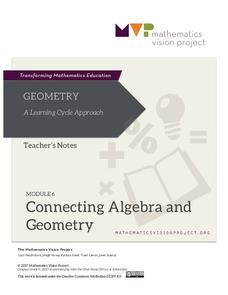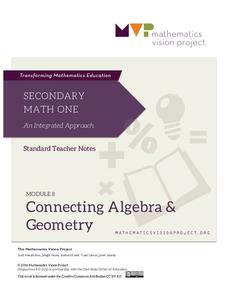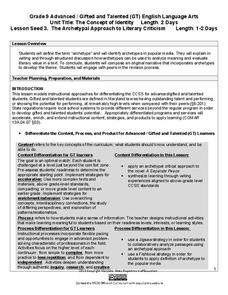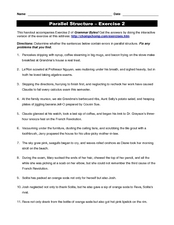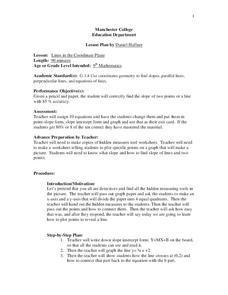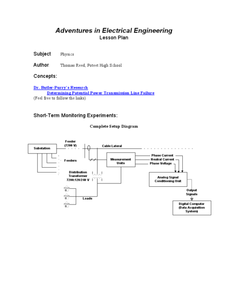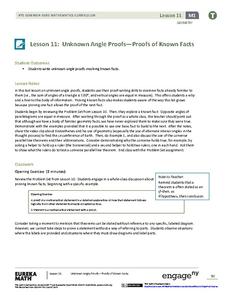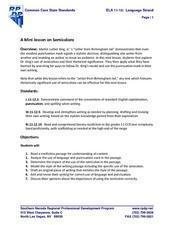National Endowment for the Humanities
Seeing Sense in Photographs & Poems
Learners analyze photographs and poetry as forms of each other. In this poetry and photography analysis lesson, students use the photographs of Alfred Stieglitz and poetry from William Carlos William to explore how poetry and painting...
Mathematics Vision Project
Module 6: Connecting Algebra and Geometry
A geometry module connects algebraic reasoning to geometry. It challenges scholars to investigate the slope criteria for parallel and perpendicular lines, prove theorems involving coordinate geometry, and write equations for circles and...
Mathematics Vision Project
Connecting Algebra and Geometry
Connect algebra and geometry on the coordinate plane. The eighth unit in a nine-part integrated course has pupils develop the distance formula from the Pythagorean Theorem. Scholars prove geometric theorems using coordinates...
Mathematics Vision Project
Module 3: Geometric Figures
It's just not enough to know that something is true. Part of a MVP Geometry unit teaches young mathematicians how to write flow proofs and two-column proofs for conjectures involving lines, angles, and triangles.
Mathematics Vision Project
Transformations and Symmetry
Flip, turn, and slide about the coordinate plane. Pupils define the rigid motions and experiment with them before determining the relationships of the slopes of parallel and perpendicular lines. The sixth unit in a nine-part series...
Geometry Accelerated
Coordinate Geometry Additional Practice
Your learners get extra practice using coordinates in calculating mid points, finding end points, deciding if points are collinear, calculations using slope concepts, writing linear equations, using triangles and quadrilaterals, and...
Maryland Department of Education
The Concept of Identity Lesson 3: The Archetypal Approach to Literary Criticism
As class members continue their study of approaches to literary criticism, readers examine the symbolism and archetypal patterns in John Knowles' A Separate Peace, and how these parallels are used to develop a theme...
Curated OER
Parallel Structure
In this parallel structure worksheet, students determine correctly and incorrectly written sentences and make all correct. Students write twenty answers.
Curated OER
Chapter 2.4 - Writing Linear Equations
In this slope-intercept instructional activity, students solve 18 problems in which they find the slope-intercept and y-intercept of a graph given an equation, find the equation given a point and the slope-intercept, and find the...
Curated OER
Lines in the Coordinate Plane
Students graph lines in a coordinate plane. In this geometry lesson, students graph lines on a coordinate plane, and identify the slope. They classify the lines as parallel or perpendicular and write an equation of a given line.
Curated OER
Adventures in Electrical Engineering
Students explore electricity by conducting a series of experiments. In this physics lesson, students discover the relationship between current, voltage and resistance. They calculate voltage and power in a given system.
Curated OER
Write Obama's Inaugural Address
Students practice their public speaking skills. In this interdisciplinary instructional activity, students study speeches delivered by Lincoln, Wilson, F. Roosevelt, and Kennedy. Students write the text Obama's inaugural...
Curated OER
U.S. foreign policy in the early Republic
Students research various events during the War of 1812 and then create magazine articles with supporting illustrations, students are in control of their learning.
Curated OER
Writing a Plan for Wave Observation
In this observation worksheet, students practice writing a plan for observing waves including the instruments used, the objective of the observations and the process used to collect data.
Curated OER
People in History- Anne Frank
Students examine discrimination and what it was like during WWII and today. In this writing and analyzing lesson, students read pasages from Anne Frank's diary and find connections between Anne's life and the life of people in...
Curated OER
Applying Proportionality in Scale Drawings
Sixth graders examine a blue print and discuss the reasoning behind using blue prints. In this proportionality lesson, students collaborate with their teammates to create a scale drawing. Once that is complete, 6th graders write a...
Mathematics Vision Project
Module 6: Congruence, Construction, and Proof
Trace the links between a variety of math concepts in this far-reaching unit. Ideas that seem very different on the outset (like the distance formula and rigid transformations) come together in very natural and logical ways. This...
EngageNY
Unknown Angle Proofs—Proofs of Known Facts
Lead the class in a Greek history lesson plan with a geometric twist. Pupils relate a short video about geometric properties to modern-day methods of solving for unknown angles. They discuss parallel line theorems and...
Bowland
Fish Dish
Minimize the time it takes to create a fish dish. Scholars use their knowledge of time to devise an order that accounts for different constraints. Considering jobs that can be done in parallel is essential to solving the problem.
Curated OER
What is Proofreading?
Is your essay coherent? Does it make sense? Is it formatted correctly? Does it adhere to standard English conventions? This helpful and informative slide-show walks learners step by step through the editing and proofreading process. Each...
Southern Nevada Regional Professional Development Program
A Mini lesson on Semicolons
Dr. Martin Luther King, Jr.'s "Letter from Birmingham Jail" serves as an exemplar for a mini-lesson on semicolons. Working alone or in small groups, class members first circle all the semicolons in the letter, and then consider how this...
Lampstand Press
Compare/Contrast Worksheet
Walk your class through the process of writing compare and contrast essays with this easy-to-use graphic organizer. After first using the included Venn diagram to record the similarities and differences between two subjects,...
EngageNY
Finding Systems of Inequalities That Describe Triangular and Rectangular Regions
How do you build a polygon from an inequality? An engaging lesson challenges pupils to do just that. Building from the previous lesson in this series, learners write systems of inequalities to model rectangles, triangles, and even...
Novelinks
The Adventures of Tom Sawyer: Cubing Strategy
The toss of a die determines what questions your pupils will answer in this lesson. Learners respond to questions based on Bloom's taxonomy, discussing The Adventures of Tom Sawyer with classmates along the way. They finish by writing up...



